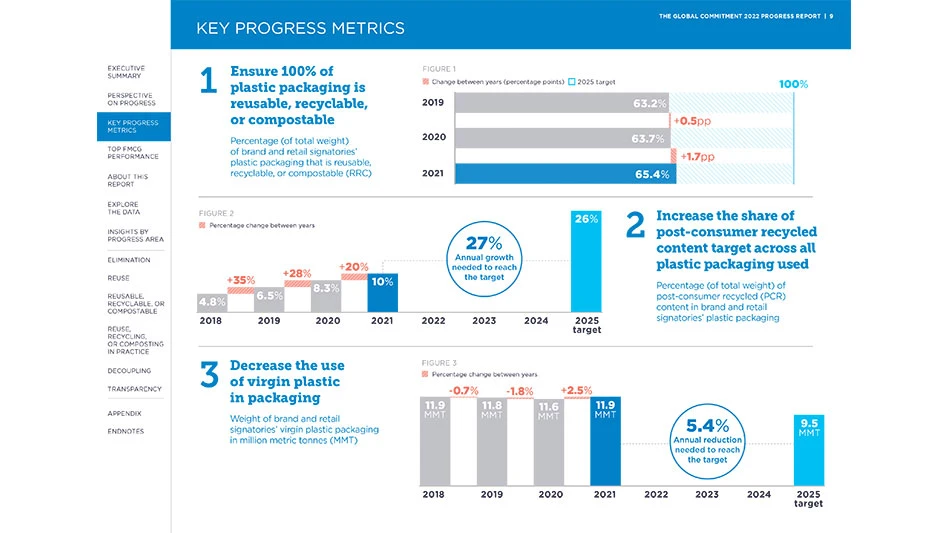
The Ellen MacArthur Foundation
The Ellen MacArthur Foundation says global efforts to address plastic pollution are showing progress, but more difficult measures will be needed to end the crisis. The conclusion was drawn after reviewing the progress that has been made since the New Plastics Economy Global Commitment was launched in 2018 by the U.K.-based foundation and the UN Environment Programme.
Since its launch, more than 1,000 organizations, from companies to governments, have signed on to the Global Commitment to stop plastic packaging from becoming waste.
RELATED: Ellen MacArthur Foundation shares progress and setbacks with its Global Commitment
Over the past five years, business signatories, which represent 20 percent of the world’s plastic packaging industry, according to the foundation, have outperformed their peers when it comes to taking positive action to tackle plastic waste, reducing their use of several problematic and avoidable plastic items, stabilizing virgin plastics use and more than doubling their share of recycled content, according to “Global Commitment 2022 Progress Report” and a companion publication, the Ellen MacArthur Foundation’s “Global Commitment Five Years In.”
The progress report notes that brand and retail signatories doubled their use of recycled content in the three years from 2018 through 2021. However, as a group, brands and retailers have increased their total plastic packaging use (up by 4.3 percent) in 2021 compared with 2020. This increase has outpaced recycled-content progress, leading to a 2.5 percent increase in virgin plastic use compared with 2020, which the Ellen MacArthur Foundation says is back to 2018 levels.
While progress is being made in some areas, key 2025 targets likely will be missed, the foundation says. This prospect reinforces the urgency for businesses to accelerate action, particularly around reuse, flexible packaging and decoupling business growth from packaging use; and governments must take immediate action to accelerate progress and have the opportunity to promote high ambitions in upcoming negotiations for a legally binding instrument on plastic pollution, the UN Treaty on Plastic Pollution, also known as the Global Plastics Treaty.
According to the “Global Commitment Five Years In,” signatories have increased their use of recycled plastics by 1.5 million metric tons per year. However, with a large part of industry not yet taking action, and business signatories likely to miss key 2025 goals, the world is not on course to eliminate plastic waste and pollution, the Ellen MacArthur Foundation says.
The foundation predicts 20 trillion flexible packaging items, such as wrappers, pouches and sachets, will end up in the ocean by 2040 unless more ambitious binding policy and regulatory measures are combined with greater business action.
“The learnings from the Global Commitment over the past five years have shown it’s possible to make meaningful progress towards keeping fossil resources in the ground and plastics out of the ocean," says Sander Defruyt, plastics initiative lead at the Ellen MacArthur Foundation.
“But the world remains far off track from fixing the plastic pollution crisis. The international legally binding instrument on plastic pollution currently being negotiated, alongside accelerated business action, are now needed. We can’t pick or choose from either of these measures—both are crucial to ensure progress is pushed further and faster.”
Sheila Aggarwal-Khan, director of the UNEP Industry and Economy Division, says, “In the past five years, the Global Commitment has demonstrated how plastic pollution can be curbed while shedding light on the ‘pain points’ that need to be addressed to get the system redesign right.
“The ongoing negotiation for an international legally binding instrument is a chance to agree the rules, measures and incentives for an enabling environment to end plastic pollution. Governments, businesses and all relevant stakeholders must act with unity to ensure we do not miss this historic opportunity.”
The Ellen MacArthur Foundation says industry leaders have key hurdles to overcome to scale reuse business models; tackle flexible packaging and pollution, particularly in countries with the highest plastics leakage rates; and establish infrastructure for collection, reuse and recycling, supported by extended producer responsibility (EPR) policies.
The foundation says its Global Commitment will continue to serve as a key force to drive voluntary action and inform and complement the international legally binding instrument that will go through a third round of negotiations in Nairobi, Kenya, Nov. 13-19.
In reaction to the release of “The Global Commitment Five Years In,” Louise Edge, global corporate campaign lead at Greenpeace U.K. in London says, “The clear lesson from this review is that the current strategies companies are using to tackle the plastics crisis are failing. In the five years since the Global Commitment launched, it’s become more and more obvious how harmful plastic is to our health, to our wildlife, to our communities and to our climate. And yet in parallel signatory companies’ collective plastic use has continued to rise and its production is set to skyrocket.
“Big companies such as Unilever, Nestle and Coke must now finally admit that recycling is failing to address the dire impacts of their dependence on plastic.”
She adds that the scale of this crisis requires phasing out single-use plastics and transitioning to reuse and refill systems. “That has to start with companies ending the sale of the highly polluting plastic sachets, which are flooding the Global South, contaminating local neighborhoods and waterways," she says.
“The Global Plastics Treaty negotiations provide a once-in-a-generation opportunity to make these essential shifts happen. Companies must grasp this opportunity, support measures to eliminate single-use plastics and mainstream reuse and back calls for a global target to cut plastic production by at least 75 percent by 2040.”
Latest from Waste Today
- IEG appoints Ty Rhoad to chief revenue officer
- Veralto invests in Axine Water Technologies
- Meridian Waste announces promotions and new hires
- Neste, Air Canada sign SAF supply agreement
- Municipal Waste Management merges with Collective Waste Solutions
- AMP names CEO
- Oregon DEQ rejects CAA’s second draft plan
- Texas Disposal Systems opens C&D recycling facility





